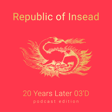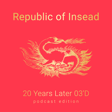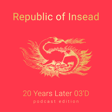
I now introduce myself as a farmer when people ask what I do and nobody takes me seriously
If you invested all of your tuition in Apple stock, last time I checked, it was about $22 million.
20 YEARS IN PERSPECTIVE:
Just over ten years ago I set up my own business with a partner from INSEAD and another friend to build, own and operate renewable energy power stations in the UK.
We invested about a half a billion dollars at that time, had some great successes. I moved then to the States in 2017 to set up our US business and that business has become a solar developer.
Hardest for me has been navigating macroeconomic trends and changes.
Mostly we wanted to have healthy and happy families. And so that was always the first priority.
When we started the business I always wanted to protect myself from failure, so I spent a lot of time thinking about downside solutions and managing through crisis and having backup plans, which has served me very well. I didn't plan for success in the same way. And it's just now that I'm starting to realize that thinking about what you're going to do when things go well is just as important, as thinking about how to manage when things go badly.
ON TOPIC: Renewable energy, sustainability, regenerative agriculture
When I started in renewables, I was slightly kidding that nobody knew what they were doing, but only slightly.
It was a time when renewable energy was an exciting place to be, there weren't a lot of very capable professionals in it, which is why I could fit in so well and there was a huge amount of profit to be made from doing it and so we set up a renewable energy investment business.
Now energy isn't renewable energy, renewable is just part of the mix, in fact it's the cheapest part of the mix, it's the most economically obvious part for everyone to build and it's where the investment capital is going in.
There is clearly still economic opportunity left in renewable energy and because of inflation reduction act and similar policies around the world and a need for battery storage and potentially a new hydrogen economy and grid upgrades requirements, there's still a lot of work to do.
We used to look at curves for solar and wind deployment globally and in the UK when we were starting the business. And every time you looked at a forecast curve for deployment, it was significantly understated.
And so the drive now, which is an economic drive as opposed to just an ethical drive, is creating big change in the sector and I see a path towards significant change in the grid structure to a much, much higher use of renewable energy. And then the same thing on the automotive side and transport side.
That transfer from people feeling obliged to change to things becoming mass market, I can feel that change happening. I know it's not going to happen as quickly as we need it to happen and I would like it to be quicker, but I think good people are working on these problems and consumers want change and so I'm hopeful.
In renewables that was driven by subsidy; in regenerative organic farming that's driven by consumers’ willingness to pay. And so the fact that organic produce in the US costs significantly more than non-organic is because consumers see value in that.
Soil is a natural sink of carbon, there are lots and lots of studies that suggest that it could be the solution, the silver bullet to stopping climate change by effectively putting carbon back into the soil and so that's a core tenet of regenerative farming.
All THINGS INSEAD AND GIVING BACK
INSEAD has been a huge part of my work life since I started and it’s been fundamental to what's happened over the last 20 years. And so I had a great time there, I continue to have a great time with other people all the time and I know how unbelievably lucky I was to be able to go and be able to afford it


